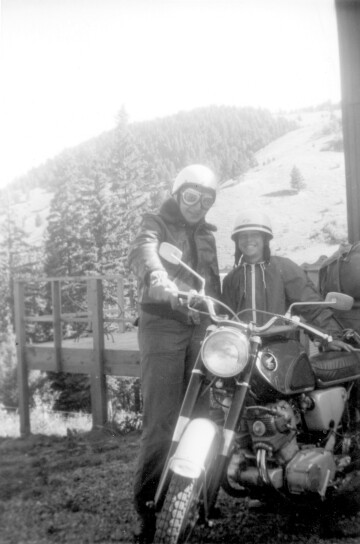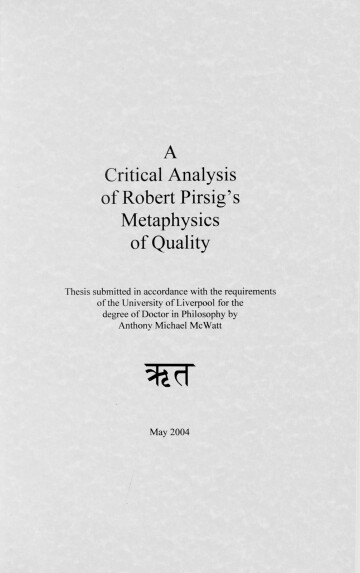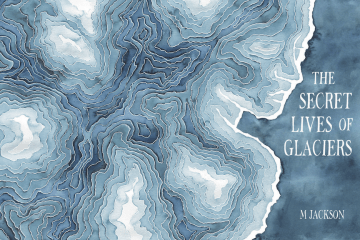Zen and the Art of Motorcycle Maintenance
Letters, documents, and books; oh my! Special Collections and Archival Informatics at Montana State University Library recently acquired a trove of material about Robert Pirsig, author of Zen and the Art of Motorcycle Maintenance (ZAMM), collected by Dr. Anthony M. McWatt over the course of twenty-plus years.
The McWatt Collection on Robert Pirsig is the accumulation of correspondence, documents, monographs, audio cassettes, and CDs created between 1974-2004. He offered the materials for auction in December 2017 through Sotheby’s, and they were purchased by the Montana State University Library via online auction through the firm’s base in London. McWatt assembled 1.3 linear feet of material during the nine-plus years that he corresponded with Pirsig and other individuals while pursuing his doctorate.

Robert M. Pirsig, arguably the most famous faculty member in Montana State University history, was born in Minneapolis, Minnesota on September 6, 1928. He graduated from high school at the age of 15 in 1944. He enlisted in the Army after World War II; during his time in South Korea he encountered the Asian philosophies that inspired his own theories. Pirsig received his Bachelor of Arts in philosophy from the University of Minnesota in 1950. He received his Master of Arts from the University of Minnesota in 1958. Pirsig’s specialization was in journalism with Hindu philosophy as a minor. He was an English instructor at Montana State University (then Montana State College) from September 1959 to June 1961. In 1974, he published ZAMM, a narration of a father and son’s summer motorcycle journey through the American Northwest. The book has been recognized as one of the most influential of the twentieth-century. In 1991, he published Lila, a work which examined life’s critical questions via a sailboat journey on the Hudson River. Pirsig died April 24, 2017 in South Berwick, Maine.
Dr. Anthony M. McWatt resides in Liverpool, England. McWatt received his Master of Arts from the University of Sheffield in 1990 with an emphasis in Socio-Legal Studies. McWatt’s MA thesis drew heavily on ZAMM. He began corresponding with Pirsig in 1993 while he worked towards completion of his doctoral degree. In a letter dated July 22, Pirsig informs McWatt that the “complexity of metaphysics can be overwhelming, particularly when philosophers don’t write very clearly.” He went on to state that “if you read them very slowly…it will get easier for you and more interesting as you go along.” McWatt was fortunate to exchange quality communication with Pirsig. The conversations that they engaged in provided the clarity and enhanced explanation McWatt needed to expand his research into a doctoral thesis, A Critical Analysis of Robert Pirsig’s Metaphysics of Quality. McWatt received his doctorate from the University of Liverpool in 2005.

According to Dr. Seuss “it is better to know how to learn than to know.” Both Pirsig and McWatt undertook a path to understanding the fundamental nature of knowledge, reality, and existence on their philosophical journeys through their creation of both ZAMM and A Critical Analysis of Robert Pirsig’s Metaphysics of Quality. Pirsig’s sense of dharma or “duty that transcends one’s own personal self” led to the creation of a text that touched a vast audience via the more than 5 million copies sold. As one individual inspired by the text, Dr. McWatt expressed that ZAMM “seeks a return to the wisdom unwittingly lost by Plato and his followers in the philosophy, science and religion of modern, industrialized countries.” McWatt’s exploration of the philosophy did not end with authorship of his own text; he traversed the distance to Montana State University, Pirsig’s old stomping grounds, during the creation of a documentary titled On the Road with Robert Pirsig in 2006. The meticulous development of his own philosophic thesis and accumulation of the materials making up the collection were intended to “enlarge and improve understanding at the most general levels of philosophic comprehension.”
In Dr. McWatt’s own words “knowledge is too commonplace…[and]…wisdom (in the Socratic sense) still sadly remains relatively rare.” McWatt’s collection at Montana State University Library delves into Pirsig’s philosophy. Over the course of their correspondence the two probed deeply into Pirsig’s thought process. This examination required Pirsig to clarify and explain various aspects of his ideas. He stated that “McWatt comes closer than anyone to becoming a dharma successor of [his] own work on the Metaphysics of Quality.” Distillation of these conversations provided McWatt with the insight necessary to become the first scholar to receive a doctorate based on the philosophy Pirsig developed.
McWatt’s collection is divided into four groups; groups one and two pertain to McWatt’s correspondence with Robert Pirsig and others including Robert’s wife Wendy, and Bodvar Skutvick a Norwegian painter, artist, and writer. The exchange of letters ranges from discussions on Pirsig’s philosophical theories, Zen Buddhism, and Pirsig’s books. Also discussed are courses that focused on or utilized ZAMM, which include a few taught by McWatt. Group three focuses on Robert Pirsig and ZAMM; of note in this series are two autographed copies of Pirsig’s ZAMM and reviews for both books. The fourth group comprises McWatt’s research notes, theses and lecture notes from a series of lectures on ZAMM, as well as a bound copy of his doctoral dissertation.
“We shall not cease from exploration, and the end of all our exploring will be to arrive where we started and know the place for the first time” stated T.S. Elliot. Dr. McWatt’s collection at the Montana State University Library is only one avenue of exploration for Pirsig researchers. Other items at the library include a faculty biography file, copies of both ZAMM and Lila, as well as the video On the Road with Robert Pirsig. Additionally, the Robert and Genevieve DeWeese Collection on Robert Pirsig can be found in Special Collections. Featured in ZAMM, the DeWeeses were contemporaries of Pirsig and Robert DeWeese taught with him at MSU. The DeWeeses could be found at the center of an intellectual community of modernist “thinkers” and artists found in Bozeman and the university. Their friendship with Pirsig lasted until his death. A photocopy of the original ZAMM manuscript can be found in the DeWeese collection with handwritten marginal notes, along with correspondence from Pirsig, ephemera, and photographs. Additionally, visitors to the university have been known to make a pilgrimage to Montana Hall to view the office he occupied during his tenure.
As Emerson mentions, “life is a journey, not a destination.” The recently acquired materials in the Dr. Anthony M. McWatt Collection on Robert Pirsig provide a stepping stone for individuals to use as they walk along the path towards their own philosophic understanding. At the commencement of their conversations, Pirsig told McWatt that expanding the Metaphysics of Quality for a PhD would not be easy; in that, he was correct. McWatt’s journey towards his doctorate took more than ten years to complete. His journey with Pirsig’s work is a destination that continued on with courses to the community on ZAMM, a textbook, documentaries, articles, as well as lectures and speaking engagements.
Heather C. Hultman is a Curator at the Montana State University Library.
